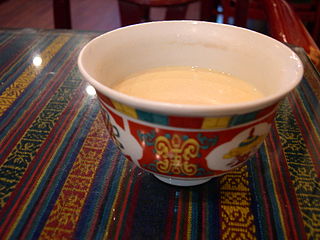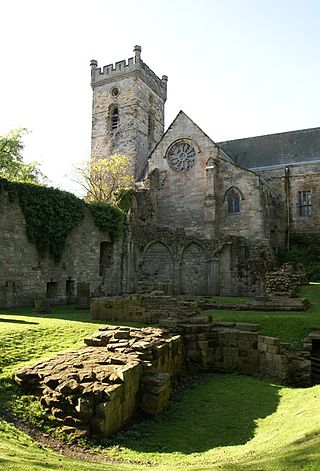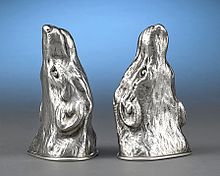
A Burns supper is a celebration of the life and poetry of the poet Robert Burns, the author of many Scots poems. The suppers are normally held on or near the poet's birthday, 25 January, known as Burns Night also called Robert Burns Day or Rabbie Burns Day. However, in principle, celebrations may be held at any other time of the year. Burns suppers are held all around the world.

Haggis is a savoury pudding containing sheep's pluck, minced with chopped onion, oatmeal, suet, spices, and salt, mixed with stock, and cooked while traditionally encased in the animal's stomach though now an artificial casing is often used instead. According to the 2001 English edition of the Larousse Gastronomique: "Although its description is not immediately appealing, haggis has an excellent nutty texture and delicious savoury flavour".

Hogmanay is the Scots word for the last day of the old year and is synonymous with the celebration of the New Year in the Scottish manner. It is normally followed by further celebration on the morning of New Year's Day and, in some cases, 2 January—a Scottish bank holiday. In a few contexts, the word Hogmanay is used more loosely to describe the entire period consisting of the last few days of the old year and the first few days of the new year. For instance, not all events held under the banner of Edinburgh's Hogmanay take place on 31 December.
Lallans, is a term that was traditionally used to refer to the Scots language as a whole. However, more recent interpretations assume it refers to the dialects of south and central Scotland, while Doric, a term once used to refer to Scots dialects in general, is now generally seen to refer to the Mid Northern Scots dialects spoken in the north-east of Scotland.
Scottish English is the set of varieties of the English language spoken in Scotland. The transregional, standardised variety is called Scottish Standard English or Standard Scottish English (SSE). Scottish Standard English may be defined as "the characteristic speech of the professional class [in Scotland] and the accepted norm in schools". IETF language tag for "Scottish Standard English" is en-scotland.

Flyting or fliting, is a contest consisting of the exchange of insults between two parties, often conducted in verse.
Teuchter is a Lowland Scots word sometimes used to offensively describe a Scottish Highlander, in particular a Gaelic-speaking Teuchter. The term is also in use with more broader meanings attached, commonly applied to any Scot perceived to be from a rural area, and within Glasgow those who are from outwith the Greater Glasgow area. It is offensive, equivalent to other cultural epithets used by more powerful groups to describe people they have oppressed, but is often seen as amusing by the speaker. The term is contemptuous, essentially describing someone seen to be uncouth and rural.
William Hamilton was a Scottish poet. He wrote comic, mock-tragic poetry such as "The Last Dying Words of Bonny Heck" - a once-champion hare coursing greyhound in the East Neuk of Fife who was about to be hanged, for growing too slow. It is written in anglified Scots, with a sprightly narrative and wry comic touches.

Stephen Nicol is a Scottish retired professional footballer who mainly played as a right back and occasionally played in other positions across defence and midfield. He played for the successful Liverpool teams of the 1980s. He was also a regular member of the Scotland national team and represented his country at the 1986 FIFA World Cup.
Craic or crack is a term for news, gossip, fun, entertainment, and enjoyable conversation, particularly prominent in Ireland. It is often used with the definite article – the craic – as in the expression "What's the craic?", meaning "How are you?" or "What's happening?". The Scots and English crack was borrowed into Irish as craic in the mid-20th century and the Irish spelling was then reborrowed into English. Under both spellings, the term has become popular and significant in Ireland.

The culture of Scotland refers to the patterns of human activity and symbolism associated with Scotland and the Scottish people. The Scottish flag is blue with a white saltire, and represents the cross of Saint Andrew.

Butter tea, also known as Bho jha, cha süma (Tibetan: ཇ་སྲུབ་མ་, Wylie: ja srub ma, "churned tea", Mandarin Chinese: sūyóu chá, su ja in Dzongkha, Cha Su-kan or "gur gur cha" in the Ladakhi language and Su Chya or Phe Chya in the Sherpa language, is a drink of the people in the Himalayan regions of Nepal, Bhutan, India, Pakistan especially in Khyber Pakhtunkhwa and Gilgit-Baltistan, Afghanistan, Kazakhstan, Tajikistan, East Turkestan, Tibet and western regions of modern-day China and Central Asia. Traditionally, it is made from tea leaves, yak butter, water, and salt, although butter made from cow's milk is increasingly used, given its wider availability and lower cost.
"The Parting Glass" is a Scottish traditional song, often sung at the end of a gathering of friends. It has also long been sung in Ireland, where it remains popular; this has strongly influenced how it is often sung today. It was purportedly the most popular parting song sung in Scotland before Robert Burns wrote "Auld Lang Syne".

A bawbee was a Scottish sixpence. The word means a debased copper coin, valued at six pence Scots, issued from the reign of James V of Scotland to the reign of William II of Scotland. They were hammered until 1677, when they were produced upon screw presses.

Elizabeth Melville, Lady Culross (c.1578–c.1640) was a Scottish poet.

"The Dowie Dens o Yarrow", also known as "The Braes of Yarrow" or simply "Yarrow", is a Scottish border ballad. It has many variants and it has been printed as a broadside, as well as published in song collections. It is considered to be a folk standard, and many different singers have performed and recorded it.

Clan Little is a Scottish clan of the Borders. The clan does not currently have a chief and is therefore considered an armigerous clan. The Clan Little Society had a Guardian in place of a clan chief but, since his death in 2007, no suitable successor has appeared.

Poetry of Scotland includes all forms of verse written in Brythonic, Latin, Scottish Gaelic, Scots, French, English and Esperanto and any language in which poetry has been written within the boundaries of modern Scotland, or by Scottish people.
Charles Rogers (1825–1890) was a 19th-century Scottish minister and prolific author. In the second half of his life, he repeatedly ran into trouble for setting up publication societies from which he gained financial benefit.













